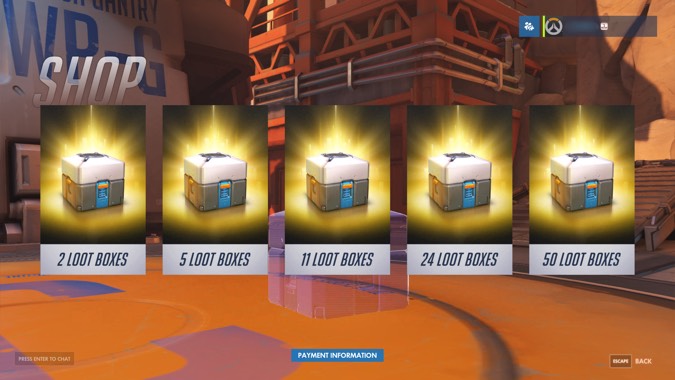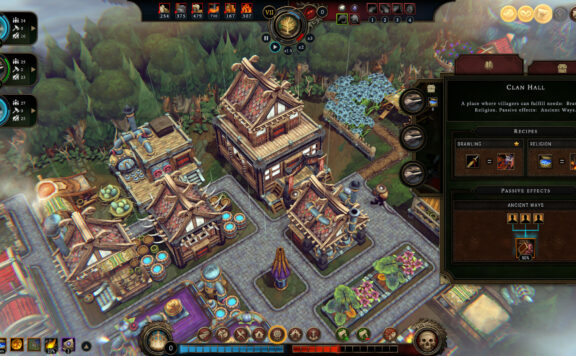You know them. You loathe them. For a time, they were a bane of almost every AAA out there. Loot boxes, the randomized virtual chests that promised neat items for your favorite game, but in reality, ended up being a shiny disappointment. At the height of their popularity, they were so offensively prevalent that there were even mock games like “I Can’t Believe It’s Not Gambling.”
Game developers do know how to make them tempting, though. Winning a legendary skin from an Overwatch loot box is not unlike winning at online slots. The lights, the sounds, the anticipation until the “spinning” stops, the whole shebang. It’s no wonder why many claim to have gotten addicted to loot boxes, even if they never had to spend any cash on their initial attempts.
Loot boxes have been linked to problem gambling and even outright banned in some countries. Yet, they somehow stuck around. The dust settled, and we still have FIFA Ultimate Team packs, aforementioned Overwatch loot boxes, alpha packs in Rainbow Six: Siege, and more. They still regularly dish out duplicates or meager amounts of in-game currency, drip-feeding players some semblance of real content.
Games containing loot boxes still pass with an “E for Everyone” ESRB rating and can be freely bought at stores like Humble Bundle. Don’t even get us started on mobile gaming, where it’s a whole other world of exploitative mechanics designed to create an addiction.
All attempts to fight the system might seem futile. Can we even, as a gaming community, defeat the dreaded loot box? Are there games that use this system properly? For that, we’ll need to look at where it all began and how loot boxes evolved.

Loot Boxes: A Brief History
There’s no exact point in time when the idea of a loot box came to be, at least in their physical form. Sticker albums, Kinder surprises, capsule toys, and similar randomized boxes existed for decades, long before gaming.
But, we can pinpoint the exact moment when these random chance boxes enter the video game world. In 2004, side-scrolling MMORPG MapleStory introduced something called “gachapon tickets” that replicated this experience from real-life gachapon machines. At 100 yen a pop (or $1), they were an inexpensive way to grab some new cosmetics for your character and ended up being a massive success.
Soon after, the West embraced this idea. In FIFA 09, Electronic Arts introduced its Ultimate Team mode, where players would open up packs of cards representing football players. They would then assemble their teams for online play using those cards. Obviously, highly rated all-star players were a rarity, making players buy into the system to open more packs and hope to score those rare cards.
A year later, Valve added loot crates to its popular multiplayer shooter Team Fortress 2. The boxes dropped into players’ inventories at regular intervals during play, but they required a $2 purchase to open. Players absolutely embraced this, as each item gained through these boxes could be traded to other players. The game quickly became known as “Hat Fortress”, and it was one of the strongest gaming economies at the time, where people sold their fancy hats for Steam games or cold, hard cash. It was, in fact, so successful that Valve switched the game over to the free-to-play format and, thus, increased its player base 12 times.
With such experiments becoming a massive success for game publishers, everybody jumped aboard the loot box train, and the rest is, as they say, history.

Are Loot Boxes Redeemable?
Once the general public and legislators brought torches, pitchforks, and updated laws to the table, we all wondered the same – will loot boxes go away, and what other horrible practice will gaming companies think of next? The truth is, they wouldn’t be in so many games if they didn’t prove so profitable, so getting rid of them completely wasn’t going to happen overnight.
Some games tried to create a more pro-consumer loot box system. It needed to tick several boxes – not to involve any cash at all, to offer everyone a fair chance of earning in-game items, and not to affect the balance of online multiplayer. In other words, loot boxes would stick to cosmetics. Arguably, even such a system continues to be a form of drip-feeding content and can trigger addictive responses in certain players. Still, it’s an improvement over the original, for sure.
Fighting games were probably the most notable genre for trying to reinvent the classic loot box. Dragon Ball FighterZ, for example, gives out various cosmetics you can use in the game’s hub, and the currency is earned at an incredibly fast rate. Tekken 7 went even further and offered players a chance to earn in-game currency for absolutely every activity and a treasure mode where consecutive wins give you random cosmetics.
Warhammer: Vermintide 2, on the other hand, had randomized loot that included weapons, armor, and some cosmetics. The players were rewarded with more pulls and a better chance for high-quality gear if they completed levels at higher difficulties or performed bonus tasks during missions. You can still buy cosmetic items for cash, though.
One of the recent examples is Hot Wheels Unleashed. The game replicates collecting real-world Hot Wheels cars and dishes out new vehicles and parts through loot boxes but doesn’t involve any money (at the time of writing this article, at least). Yes, you can still get duplicates, but at least the drop rate is high enough for players not to feel burdened by this system.
In conclusion, loot boxes may not be as prominent in video games as they used to be, but they aren’t going away anytime soon. We’d still prefer a classic progression system over loot boxes any day of the week, and we aren’t alone. Battle passes are sort of replacing them, so here’s hoping our beloved video games get back on the right track. It’s supposed to be fun, after all. Addictive, sure, but not because you are gambling for a new character or weapon skin.







